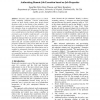Free Online Productivity Tools
i2Speak
i2Symbol
i2OCR
iTex2Img
iWeb2Print
iWeb2Shot
i2Type
iPdf2Split
iPdf2Merge
i2Bopomofo
i2Arabic
i2Style
i2Image
i2PDF
iLatex2Rtf
Sci2ools
105
Voted
ESCIENCE
2006
IEEE
2006
IEEE
Authorizing Remote Job Execution Based on Job Properties
: E-Science often requires access to remote Grid computing platforms. Current authorization systems on these remote systems have largely based decisions solely on the identity of the submitter -- the job is permitted to execute on the local resource if the job originates from an authenticated and authorized end-user. The problem with this approach is that there is no consideration to what the job will/should do when executed, so an errorful or malicious job -- even from what purports to be a trusted user -- can create significant damage before an operator notices and can kill or suspend the job. This paper presents a novel end-to-end job execution framework in which the properties (behavior) of the job are taken into account for the authorization decision. Experimental results show the duration to perform the authorization and to establish a subsequent restrictive execution context is sufficiently low
Authorization | Current Authorization Systems | Distributed And Parallel Computing | End-to-end Job Execution | ESCIENCE 2006 |
Related Content
| Added | 22 Aug 2010 |
| Updated | 22 Aug 2010 |
| Type | Conference |
| Year | 2006 |
| Where | ESCIENCE |
| Authors | Sang-Min Park, Glenn S. Wasson, Marty Humphrey |
Comments (0)

